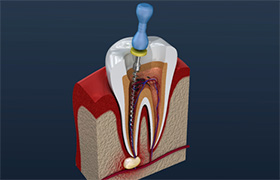
Root Canal TReatment Aurora
Save Your Smile with a Root Canal
If you have a severely damaged or infected tooth, do not have it pulled! We can save it with a root canal in Aurora. Although they have a bad reputation for being painful, new advancements in dentistry now make them no worse than a traditional filling. The endodontic procedure reinstates your tooth’s health, allowing it to remain strong and healthy for several years to come. In fact, when performed by a qualified and an experienced dental professional, they have over a 95% success rate. Supported by continued training in dentistry, Dr. Ricci and Dr. Mauck can save your smile.
What is a Root Canal?

Root canals are one of the most commonly performed restorative treatments. On average, more than 15 million are conducted each year. Although they are common, they are only recommended when there are no other viable treatments to save your tooth from extraction.
The procedure involves removing any areas of decay from your enamel and dentin. The inner layer of your tooth, known as the pulp, is taken out. Your tooth is sterilized and sealed to restore its health. To reinstate its function and appearance, a custom-made dental crown is placed over it.
Do I Need a Root Canal?

Your dentist in Aurora performs a comprehensive examination to determine if a root canal is in your best interest. If you experience certain symptoms, you may need the treatment, such as:
- Darkening of the tooth.
- Lingering sensitivity when exposed to hot or cold foods and drinks.
- Pain or tenderness when applying pressure to the tooth.
- Severe toothache.
- Pimple-like bump appearing on the gums near the tooth.
What Can I Expect?

After your consultation, you are scheduled for your procedure. A local anesthetic is used to reduce any discomfort. Special dental tools remove the areas of decay and the pulp. Your tooth is sterilized before being sealed using a special material called gutta-percha.
An impression of your mouth is taken to create a high-quality restoration. It is crafted from all-ceramic material to look like a natural tooth. It is designed to meet your exact size, shape, and color needs to blend in when you smile. The specifications are sent to the dental lab where they make your crown.
It can take the lab a couple of weeks to make it with accuracy, so we attach a temporary one while you wait. After your permanent restoration is sent back to our office, you return to have it bonded in place. With the right aftercare, your new crown can last an average of 10 years before needing to be replaced.
After your procedure, it is normal to experience some slight tenderness or pain for a couple of days. It is best to avoid chewing in the tooth until it subsides. You can also take over-the-counter pain relievers to manage your discomfort. In no time at all, you will not even notice that the crown is not your natural tooth.
Understanding the Cost of Root Canals

Before you begin the root canal process, you should have a clear idea of how much you can expect to pay for your treatment. Each patient has unique needs to consider, so the cost of root canal therapy isn’t set in stone. At your initial visit, we’ll give you an estimate and explain the factors that will influence the final price. We can also go over your payment options and help you come up with a plan to make your root canal therapy as affordable as possible.
Factors That Can Affect Root Canal Cost

We can only determine the cost of your root canal therapy once we’ve examined the tooth in question. Some teeth tend to be more costly to treat than others. In particular, the molars in the back of your mouth are harder to reach and clean; thus, root canal treatments for molars tend to have a higher price compared to those for the front teeth.
Depending on how complex your case is, it may be necessary to refer you to an endodontist. This can have an impact on how much you pay for the root canal procedure.
Finally, any necessary additional services must be considered. For example, sometimes a new dental crown will need to be placed to protect the tooth. Such treatments will have to be taken into account when calculating the overall cost of root canal therapy.
Is it Cheaper to Pull My Tooth?

It might seem cheaper to simply have an infected tooth removed. However, this leaves you with an incomplete smile, which can lead to serious oral health issues that require you to pay for additional treatment. And if you choose to replace the tooth, you’ll have to consider the cost of a dental implant, bridge, or partial denture. In short, simply saving the tooth with root canal therapy is often the more budget-friendly option.
Does Dental Insurance Cover Root Canal Therapy?

Root canal therapy is performed to save infected teeth from extraction, so most dental insurance companies will at least partially cover it. Depending on what plan you have, root canal therapy can be classified as either a minor or major procedure. As such, coverage can range anywhere from 50% to 80%. Call your dental insurance company to confirm the specifics of your plan before you agree to any treatments.
Save Your Smile Today!
If you have a damaged tooth, we can save it from an extraction. Contact our office today to schedule your consultation for root canal therapy.
Root Canal FAQs
What Should I Do Before a Root Canal?
Your dentist will provide instructions for you to follow before your procedure so that you’ll be ready to go when you arrive. If you’ll be sedated during your appointment, you might be asked to fast for a few hours beforehand to reduce the risk of nausea. Otherwise, you should plan to eat a healthy meal that day. Avoid consuming alcohol or using tobacco products because these are known to interfere with the topical anesthetics that will likely be used.
You might also want to take an over-the-counter pain reliever like Tylenol or ibuprofen right before your appointment to reduce the discomfort and inflammation that can occur afterward.
Also, remember to get a good night’s sleep so that you’ll be less anxious during your visit.
How Long Does a Root Canal Take?
The answer to this question varies from person to person because it depends on your circumstances. They generally last between 30 to 90 minutes, but your dentist can let you know in advance how long they expect your specific procedure to take. Some factors that impact the timeframe include:
- The severity of your condition. If your tooth is overly damaged, it may take longer to clear away all the decay and debris.
- Where the tooth is located. Teeth in the back of your mouth are harder to access and disinfect than the front ones, so they’ll naturally take longer to clean.
- The number of roots. The more passageways your tooth has, the longer it will take your dentist to clear them all out.
Are Root Canals Painful?
In the past, root canals earned a reputation for being a long and hurtful surgery. Thanks to more recent advancements in dental technology and techniques, that’s not the case today. More often than not, the procedure alleviates more throbbing than it causes.
Typically, you won’t feel anything during the procedure itself because you’ll be numbed or sedated first. Then, after it’s complete, it’s normal to experience moderate aches and swelling for a few days. These symptoms are usually mild enough to be handled with over-the-counter pain medications and should dissipate over time.
If for any reason your discomfort persists or progresses after three days, please call us so we can ensure that everything is healing as intended.
Can Root Canals Be Prevented?
The best way to avoid a root canal is to practice consistent oral hygiene habits at home to prevent dental problems like cavities and gum disease. You should thoroughly brush and floss your teeth twice daily to clear away back and bacteria buildup, and rinse with mouthwash to kill unwanted germs.
In addition to that, you should maintain regular checkups every 6 months so we can monitor your dental condition and address tooth decay before it progresses to the point that a root canal becomes necessary.
Finally, it helps to avoid overly sugary or acidic foods which contribute to cavities. Try to stick to a more wholesome diet that supports your teeth and gums. Also, drinking water in place of sugary or alcoholic beverages can keep your mouth clear of particles and food debris that attract unhealthy microbes.
Why Do I Need a Root Canal if My Tooth Doesn’t Hurt?
There’s a common misconception that a severely decayed or damaged tooth always hurts. However, that’s not the case! For example, if the infection is left alone to develop, it will eventually “kill” the nerve of the tooth, preventing it from being able to register pain. That’s why we need to look for other warning signs of trouble, including dark discoloration, inflamed gums, and persistent dental sensitivity. Simply put, even if the situation doesn’t feel urgent because you aren’t experiencing any soreness or discomfort, it’s important to schedule the necessary restorative care right away.
Can I Take Antibiotics Instead of Getting a Root Canal?
Although antibiotics are often used in tandem with root canal treatment, they aren’t an adequate replacement. That’s because the medication cannot travel to the pulp of your tooth via your bloodstream. In order to eliminate the infection and restore the look, health, and function of your tooth we need to actually remove the diseased, damaged, and otherwise compromised tissue.
What Happens if You Wait Too Long for a Root Canal?
Since your teeth cannot heal themselves, the longer you wait, the worse the root of the problem will get. In fact, it’s only a matter of time until the damage is so extensive that we will have no choice but to extract your tooth. So, even if you’ve adjusted to the pain or your symptoms seem to have gone away, it’s important that you move forward with root canal treatment – it’s the last chance we have to save your tooth!
Note: If you have any reservations about root canal treatment – whether it’s about the procedure itself or the cost – don’t hesitate to let our Aurora dental team know!
Do Root Canals Make You Sick?
The myth that root canals make you sick stems from a study conducted back in the 1920s. Although the examiner was a dentist, his claims stem from poorly designed research. In the years since, his theory has been debunked several times, and there currently isn’t any scientific evidence linking root canal treatment to an increased risk of disease. Quite the opposite: neglecting to get this restorative service can cause the damage to spread to your surrounding teeth and gums as well as the rest of your body.
I Am Scared of Getting a Root Canal. What Should I Do?
Sadly, many patients feel like they can’t share their fears, reservations, and any other emotions they are feeling with their dental team. However, we genuinely want to know what concerns you have! That way, we can address them, answer questions, and find a solution. For example, if you struggle with dental-related anxiety or need a little extra help staying calm in the treatment chair, we can see if you’re a candidate for sedation dentistry and, if you are, add it to your treatment plan.